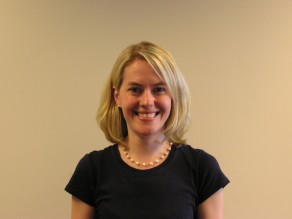Research Evaluates Care for Adults With Down Syndrome

Kristin Jensen, M.D., M.Sc.
The scientists at the Linda Crnic Institute for Down Syndrome are producing groundbreaking research into the care and treatment of people with Down syndrome. Kristin Jensen, M.D., M.Sc., an assistant professor at the Crnic Institute, had two studies published this year in the Journal of Intellectual Disability Research that help identify how patients with Down syndrome are transitioning into adult-oriented health care from child-focused providers, and whether the primary care physicians of adults with Down syndrome are adhering to age- and condition-specific preventive care. Both studies were conducted before her arrival at the University of Colorado.
In research published July 10 (click here for the abstract of the study and information on accessing the full article), Drs. Jensen and Davis found that over half of the adults studied showed incomplete transition from child to adult medical care, which may be a troubling sign as people with Down syndrome live longer lives (the average life expectancy is now over 50). Many of these patients continued to see pediatric specialty providers. Despite accounting for indicators of clinical severity, the authors found that those patients who received a mix of child- and adult-focused care ended up with higher annual charges. This was felt to be a proxy for complexity of illness that is unable to be measured in retrospective studies.
In a study published March 28 (click here for the abstract of the study and information on accessing the full article), Drs. Jensen, Taylor and Davis looked into how primary care physicians at academic medical centers adhered to age- and condition-specific care for a cohort of adults with Down syndrome. This study found variable adherence to published guidelines within this cohort, but found no difference between the type of primary care physician (i.e.- Family Medicine or Internal Medicine). Additionally, less than half of the patients in this cohort received evaluations for obstructive sleep apnea or hearing or vision loss over an eight-year study, all of which are commonly seen among people with Down syndrome.
Both studies called for additional research into how these findings relate to patient outcomes.
The Linda Crnic Institute, founded in 2008, is the first academic home for Down syndrome research in the United States. It is located at the Anschutz Medical Campus in Aurora, Colorado.
Recent Posts
- GLOBAL LEADERS – An Exclusive Interview with Erin Suelmann, Executive Director of the Down Syndrome Association of Greater St. Louis
- Sleep Apnea Across the Lifespan in People with Down Syndrome
- Government Profiles: Robert Aderholt (R-AL) & Tammy Baldwin (D-WI)
- Connor Long & Josh Peck: A GLOBAL Bromance
- GLOBAL Launches Pilot Fitness Program using Mann Method PT

 Experience our inspirational and groundbreaking videos and photos. Our children and self-advocates are beautiful AND brilliant!
Experience our inspirational and groundbreaking videos and photos. Our children and self-advocates are beautiful AND brilliant! Make sure your local Representatives are on the Congressional Down Syndrome Task Force.
Make sure your local Representatives are on the Congressional Down Syndrome Task Force.